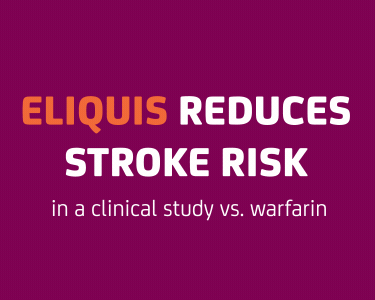Indications
-
ELIQUIS (apixaban) is a prescription
medicine used to reduce the risk of stroke and blood clots in people who have atrial fibrillation (AFib), a type of irregular heartbeat, not caused by a heart valve problem. -
ELIQUIS (apixaban) is a prescription
medicine used to treat blood clots in the veins of your legs (deep vein thrombosis) or lungs (pulmonary embolism), and reduce the risk of them occurring again. -
ELIQUIS (apixaban) is a prescription
medicine used to reduce the risk of forming a blood clot in the legs and lungs of people who have just had hip or knee replacement surgery.
Indications
-
ELIQUIS (apixaban) is a
prescription medicine used to reduce the risk of stroke and blood clots in people who have atrial fibrillation (AFib), a type of irregular heartbeat, not caused by a heart valve problem. -
ELIQUIS (apixaban) is a
prescription medicine used to treat blood clots in the veins of your legs (deep vein thrombosis) or lungs (pulmonary embolism), and reduce the risk of them occurring again. -
ELIQUIS (apixaban) is a
prescription medicine used to reduce the risk of forming a blood clot in the legs and lungs of people who have just had hip or knee replacement surgery.
Based on the results from large clinical studies, ELIQUIS is FDA approved to reduce the risk of stroke due to AFib not caused by a heart valve problem. Explore more information about ELIQUIS on this page.
In a clinical study of patients with AFib not caused by a heart valve problem,
ELIQUIS was proven better than warfarin:


ELIQUIS and other blood thinners increase the risk of bleeding, which can be serious, and rarely may lead to death. In another trial compared to aspirin, ELIQUIS had a modest increase in major bleeding.*
In the same clinical study
over 97% of patients taking ELIQUIS did not experience a stroke
Over a 3-year study, a first stroke occurred in 2.9% of warfarin patients vs. 2.3% of ELIQUIS patients.
If you’re taking warfarin, consider talking to your doctor about ELIQUIS for both these reasons: ELIQUIS was proven effective to reduce the risk of stroke due to atrial fibrillation (AFib) not caused by a heart valve problem. Plus, ELIQUIS had significantly less major bleeding* than warfarin.
*Major bleeding included noticeable bleeding with at least 1 of the following—a transfusion of 2 or more units of blood; bleeding that occurred in the brain, spine, eye, inside the abdomen, around the heart, in a joint, or in a muscle, leading to damage; or fatal bleeding.

Questions about AFib, stroke risk, and blood thinners? Learn more about
AFib & Stroke Risk.
Based on extensive clinical research
ELIQUIS was proven effective
ELIQUIS was evaluated in 2 clinical studies to evaluate stroke risk reduction in patients with AFib not caused by a heart valve problem. Clinical study results are important because they can help doctors consider and choose the right treatment for you based on their efficacy and safety results.
CLINICAL TRIALS
STUDY 1Compared ELIQUIS to warfarin in patients with AFib not caused by a heart valve problem. This group also had at least one additional risk factor for stroke (a prior stroke, age 75 or older, diabetes, heart failure, high blood pressure).
In study 1, ELIQUIS had significantly less major bleeding than warfarin.STUDY 2Compared ELIQUIS to aspirin in patients with AFib not caused by a heart valve problem who were not suitable for treatment with warfarin. This group also had at least one additional risk factor for stroke (a prior stroke, age 75 or older, diabetes, heart failure, or peripheral artery disease).
In study 2, ELIQUIS had a modest increase in major bleeding compared to aspirin.SELECTED IMPORTANT SAFETY INFORMATION
For people taking ELIQUIS® (apixaban) for atrial fibrillation: Do not stop taking ELIQUIS without talking to the doctor who prescribed it for you. Stopping ELIQUIS increases your risk of having a stroke.
ELIQUIS may need to be stopped prior to surgery or a medical or dental procedure. Your doctor will tell you when you should stop taking ELIQUIS and when you may start taking it again. If you have to stop taking ELIQUIS, your doctor may prescribe another medicine to help prevent a blood clot from forming.
ELIQUIS can cause bleeding, which can be serious, and rarely may lead to death. This is because ELIQUIS is a blood thinner medicine that reduces blood clotting. While taking ELIQUIS, you may bruise more easily and it may take longer than usual for any bleeding to stop.
You may have a higher risk of bleeding if you take ELIQUIS and take other medicines that increase your risk of bleeding, such as aspirin, nonsteroidal anti-inflammatory drugs (called NSAIDs), warfarin, heparin, selective serotonin reuptake inhibitors (SSRIs) or serotonin norepinephrine reuptake inhibitors (SNRIs), and other medicines to help prevent or treat blood clots. Tell your doctor about all of the medicines you take, including any over-the-counter medicines, vitamins, and herbal supplements.
Please see additional Important Safety Information, including Boxed WARNINGS, below.

When I asked my doctor if I needed to keep taking a blood thinner, we spoke about the clinical trial results and how ELIQUIS reduces stroke risk for patients with AFib not caused by a heart valve problem. It was good for me to see this information for myself.
Bitsy is a paid patient ambassador.
More reasons to consider ELIQUIS
It’s important for you and your doctor to discuss your lifestyle when choosing a blood thinner. Here are some other things to know about taking ELIQUIS.

With ELIQUIS there are no known dietary restrictions or watch-outs for foods like leafy greens.

Patients taking ELIQUIS do not have to go for routine INR* blood testing.
*International Normalized Ratio.
Be sure to talk to your healthcare professional to learn more about how ELIQUIS compares to warfarin.
Keep in mind that warfarin and ELIQUIS are both prescription medicines. Only your doctor can decide which blood thinner is right for you.
I was resistant, because I know that with warfarin you have to go regularly to have INR blood tests. I told my doctor my concerns and he recommended ELIQUIS, which does not require regular blood testing.
William was diagnosed with AFib not caused by a heart valve problem. He was compensated for his time and expenses.
Learn about some possible side effects of ELIQUIS.



Please see U.S. Full Prescribing Information, including Boxed WARNINGS and Medication Guide.

Talking With Your Doctor
Hear from a doctor, get tips from a nurse, and download a discussion guide to help you make the most of your time with your healthcare professional.

Savings Resources
Learn about the Free Trial Offer and how eligible patients can potentially save on out-of-pocket costs with the ELIQUIS Co-pay Card.












